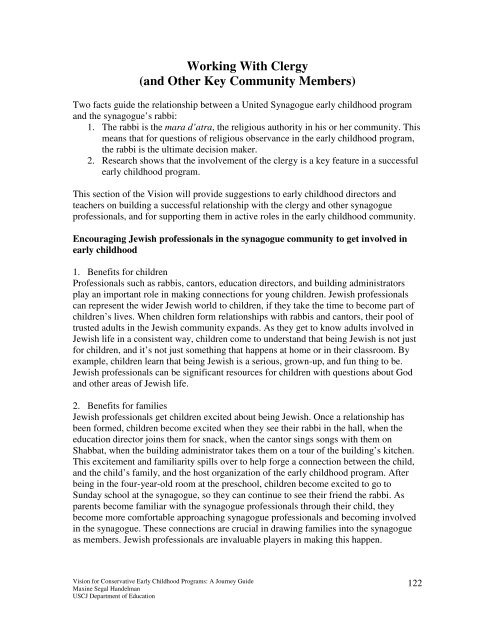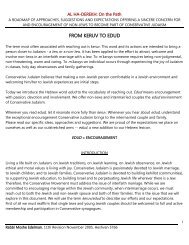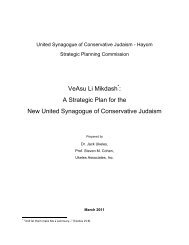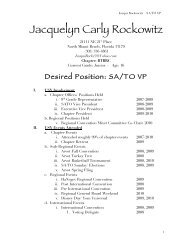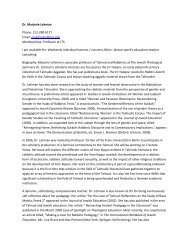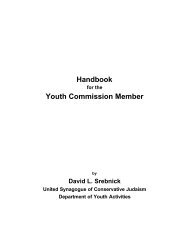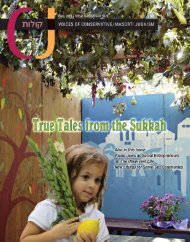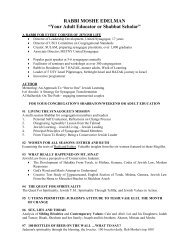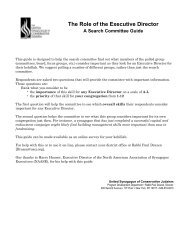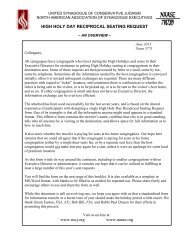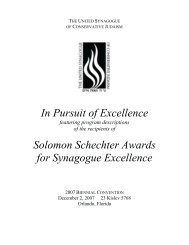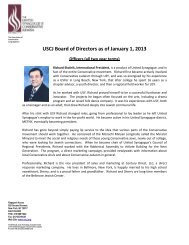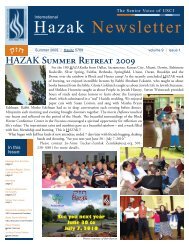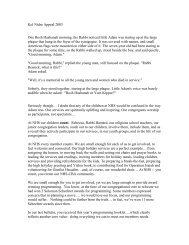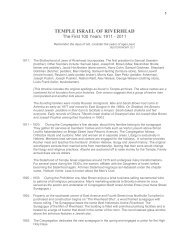Vision for Conservative Early Childhood Programs: A Journey Guide
Vision for Conservative Early Childhood Programs: A Journey Guide
Vision for Conservative Early Childhood Programs: A Journey Guide
Create successful ePaper yourself
Turn your PDF publications into a flip-book with our unique Google optimized e-Paper software.
Working With Clergy<br />
(and Other Key Community Members)<br />
Two facts guide the relationship between a United Synagogue early childhood program<br />
and the synagogue’s rabbi:<br />
1. The rabbi is the mara d’atra, the religious authority in his or her community. This<br />
means that <strong>for</strong> questions of religious observance in the early childhood program,<br />
the rabbi is the ultimate decision maker.<br />
2. Research shows that the involvement of the clergy is a key feature in a successful<br />
early childhood program.<br />
This section of the <strong>Vision</strong> will provide suggestions to early childhood directors and<br />
teachers on building a successful relationship with the clergy and other synagogue<br />
professionals, and <strong>for</strong> supporting them in active roles in the early childhood community.<br />
Encouraging Jewish professionals in the synagogue community to get involved in<br />
early childhood<br />
1. Benefits <strong>for</strong> children<br />
Professionals such as rabbis, cantors, education directors, and building administrators<br />
play an important role in making connections <strong>for</strong> young children. Jewish professionals<br />
can represent the wider Jewish world to children, if they take the time to become part of<br />
children’s lives. When children <strong>for</strong>m relationships with rabbis and cantors, their pool of<br />
trusted adults in the Jewish community expands. As they get to know adults involved in<br />
Jewish life in a consistent way, children come to understand that being Jewish is not just<br />
<strong>for</strong> children, and it’s not just something that happens at home or in their classroom. By<br />
example, children learn that being Jewish is a serious, grown-up, and fun thing to be.<br />
Jewish professionals can be significant resources <strong>for</strong> children with questions about God<br />
and other areas of Jewish life.<br />
2. Benefits <strong>for</strong> families<br />
Jewish professionals get children excited about being Jewish. Once a relationship has<br />
been <strong>for</strong>med, children become excited when they see their rabbi in the hall, when the<br />
education director joins them <strong>for</strong> snack, when the cantor sings songs with them on<br />
Shabbat, when the building administrator takes them on a tour of the building’s kitchen.<br />
This excitement and familiarity spills over to help <strong>for</strong>ge a connection between the child,<br />
and the child’s family, and the host organization of the early childhood program. After<br />
being in the four-year-old room at the preschool, children become excited to go to<br />
Sunday school at the synagogue, so they can continue to see their friend the rabbi. As<br />
parents become familiar with the synagogue professionals through their child, they<br />
become more com<strong>for</strong>table approaching synagogue professionals and becoming involved<br />
in the synagogue. These connections are crucial in drawing families into the synagogue<br />
as members. Jewish professionals are invaluable players in making this happen.<br />
<strong>Vision</strong> <strong>for</strong> <strong>Conservative</strong> <strong>Early</strong> <strong>Childhood</strong> <strong>Programs</strong>: A <strong>Journey</strong> <strong>Guide</strong><br />
Maxine Segal Handelman<br />
USCJ Department of Education<br />
122


